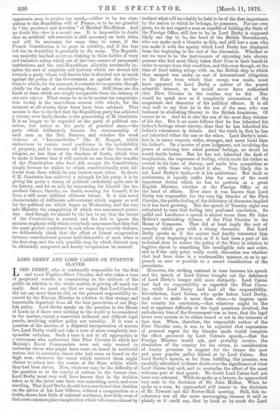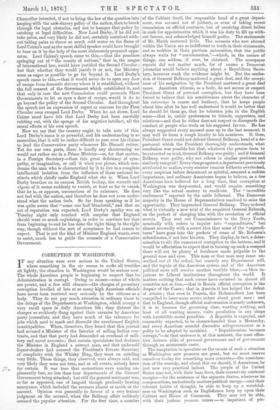LORD DERBY AND LORD CAIRNS ON FUGITIVE SLAVES. L ORD DERBY,
who is confessedly responsible for the first and worst Fugitive-Slave Circular, and who takes a tone of perplexed wonder in commenting on the attitude of the public in relation to the whole matter, is getting off much too easily. And we must say that we regret that Lord Cardwell did not say more than he did, on the personal responsibility in- curred by the Foreign Minister in relation to that strange and lamentable departure from all the best precedents of our Eng- lish policy. Lord Derby speaks on the question in the House of Lords as if there were nothing in the world to be considered in the matter, except a somewhat technical and difficult legal puzzle, involving neither policy nor morality. If it were a question of the niceties of a disputed interpretation of statute law, Lord Derby could not take a tone of more completely irre- sponsible criticism. Such a tone is not at all appropriate in a statesman who authorised that First Circular in which her Majesty's Naval Commanders were not only warned to surrender slaves who might have come on board in territorial waters, but to surrender slaves who had come on board on the high seas, whenever the vessel which received them might chance to return into the waters of the State within which they had been slaves. Now, whatever may be the difficulty of the question as to the comity of nations in the former case, Lord Derby must very well have known that in the decision taken as to the latter case there was something novel, and even startling. That Lord Derby should have sanctioned that decision on the advice of his Law Officers, without a compunction or a doubt, shows how little of national sentiment, how little even of that most common-place imagination which tells a man almost by opponents seem to profess too much,—either to be too obse- instinct what will inevitably be held to be of the first importance by the nation to which he belongs, he possesses. For our own parts, we do not regard a man as capable of holding the Seals of the Foreign Office, still less to be, as Lord Derby is supposed likely one day to be, the head of the British Government, who can make such a blunder as this, and still less a man who can make it with the apathy which Lord Derby has displayed from the beginning to the end of the discussion. Whether or not we were to be the instruments of returning into slavery persons who had most likely taken their lives in their hands in order to escape from that condition, and this even though, at the time of their taking refuge with us, the British ship to which they escaped was under no sort of international obligation to the State from which that escape was made, must have appeared to Lord Derby a matter of the purest scientific interest, or he would never have authorised that First Circular in the routine way he did. Nor would he speak now as if completely unconscious of the magnitude and character of his political offence. It is all very well to say that he is the son of the man who was foremost in abolishing Slavery in the British dominions. Of course he is. And he is also the son of the most fiery debater of his day. But it no more follows that he has inherited his father's feelings about slavery, than that he has inherited his father's vehemence in debate. And the truth is, that he has not inherited either the one or the other. Lord Derby's intel- lect is, in many respects, wider, stronger, and more lucid than his father's. On a matter of pure judgment, not involving the power of entering into other persons' feelings, no doubt he would decide better. But he has not inherited the dash of imagination the eagerness of feeling, which made his father so earnest in his hate of slavery, and made him sympathise so keenly with those who hated it also. Very likely this is not Lord Derby's fault,—it is his misfortune. But fault or misfortune, it equally unfits him for many of the most important duties which he has to perform as a great English Minister, whether at the Foreign Office or at the head of affairs. Ever since it was known that Lord Derby was responsible for the very big blunder of the First Circular, the public feeling of the deficiency of character implied in it has been growing. But the speech of Tuesday night was calculated to turn that feeling into profound conviction. So pallid and Laodicean a speech is almost worse than Sir John Holker's unshrinking defence of the First Circular in the House of Commons. That did at least imply the sort of tenacity which goes with a strong character. But Lord Derby speaks as if the matter had hardly interested him much from beginning to end, as if it had been a part of his technical duty to reduce the policy of the Navy in relation to fugitive slaves to something like intelligible rule and order, and as if the only point really worth discussion was whether that had been done in a workmanlike manner, so as to ap- proach as near as possible to a sound classification of the precedents.
Moreover, the striking contrast in tone between his speech and the speech of Lord Cairns brought out the deficiency of Lord Derby's temper still more distinctly. Lord Cairns had bad no responsibility as regarded the First Circu- lar, while Lord Derby had had all the responsibility. Nevertheless, Lord Cairns, who spoke before Lord Derby, took care to make it more than clear,—to impress upon the country his conviction,—that whatever might be the real or apparent difficulty of the legal questions involved, the anti-slavery bias of the Government was so keen, that the legal knots were certain to be either loosed or cut in the interests of that bias. When, therefore, the responsible author of the First Circular rose, it was to be expected that expressions of personal regret for the blunder made would complete the effect produced by Lord Cairns's speech,—that the Foreign Minister would ask, and probably receive, the absolution of the country for his errors, in consideration of . hearty promises to support for the future the new and more popular policy hinted at by Lord Cairns. But Lord Derby's speech, so far from fulfilling this promise, was carefully calculated to throw doubt over the significance of what Lord Cairns had said, and to neutralise the effect of the most welcome part of that speech. No doubt Lord Cairns had not been very coherent. While he spoke as a lawyer, he approached very near to the doctrines of Sir John Holker. When he spoke as a man, he approached still nearer to the doctrines of Mr. Fawcett and the Exeter-Hall meeting. Still, this in- coherency was all the more encouraging, because it said as plainly as it could say, that by hook or by crook the Lord Chancellor intended, if not to bring the law of the question into keeping with the anti-slavery policy of the nation, then to break through the legal obstacles, and not to hamper that policy by catching at legal difficulties. Now Lord Derby, if he did not take pains, and very likely he did not, certainly contrived with- out taking pains to throw as much cold water on the flame of Lord Cairns's zeal as the most skilful speaker could have brought to bear on it by the help of the most elaborately prepared appa- ratus. Lord Cairns's speech came to this,—that the practices springing out of " tte comity of nations," that is, the usages of international law, would have justified the Second Circular ; but that whether they would justify it or not, the Ministry were as eager as possible to go far beyond it. Lord Derby's speech came to this,—that it would never do to open any door of escape from domestic slavery where it is established, without the full consent of the Government which established it, and that only in case the new Commission could persuade Slave Governments to let us open a door of escape, would it do to go beyond the policy of the Second Circular. And throughout the speech not an expression of regret or remorse for the First Circular once escaped Lord Derby. When he sat down, Lord Cairns must have felt that Lord Derby had been carefully rubbing out, with the sponge of his negative intellect, all the moral effects of his own speech.
Now we say that the country ought to take note of this. Lord Derby's name is so powerful, and his understanding is so masculine, that it will be rather difficult to pass over his claims to lead the Conservative party whenever Mr. Disraeli retires. Yet for our own parts, there is hardly any shortcoming we would not rather see in a Prime Minister—er, for that matter, in a Foreign Secretary—than this great deficiency of sym- pathy,, or imagination, or call it what you please, which con- demns the man who is characterised by it to live in a complete intellectual isolation from the influence of those national in- stincts which chiefly make England what she is. When Lord Derby breathes on an earnest British feeling, the warmth and vigour of it seems suddenly to vanish, at least so far to vanish that he is, or appears, unconscious of its existence. He does not feel with the nation, and therefore he does not even under- stand what the nation feels. So far from speaking as if he was quite aware that " some one had blundered," and that an act of reparation was expected, Lord Derby's apathy was on 'Tuesday night only touched with surprise that England should want so much explaining, in order to convince her that from beginning to end he has done the right thing in the right way, though without the sort of acceptance he had reason to expect. That is not the kind of Minister England wants, even to assist, much less to guide the counsels of a Conservative Government.



































 Previous page
Previous page